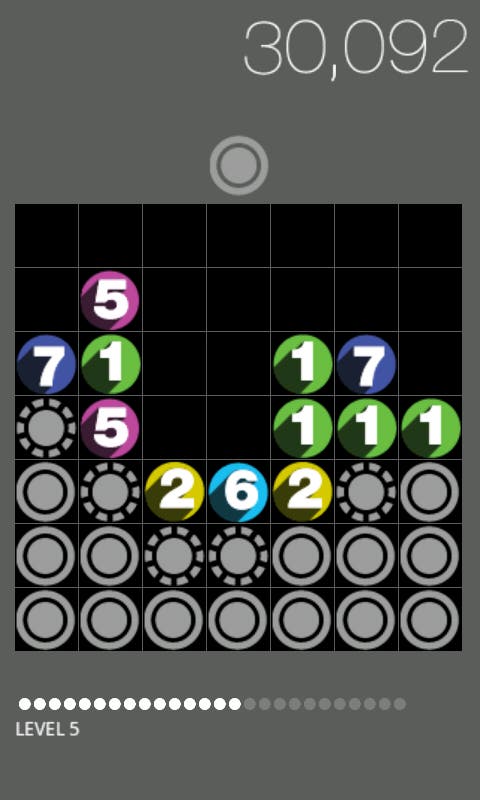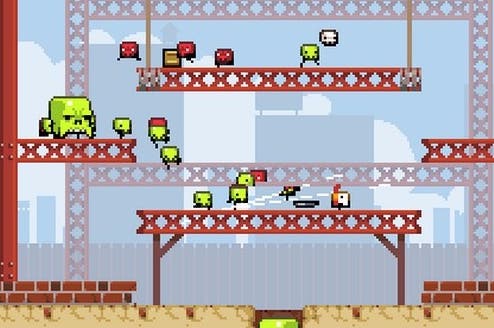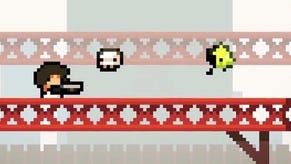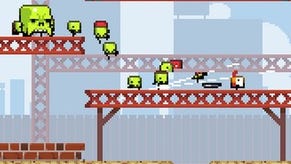The best games hold something back
What lies beneath?
Super Crate Box remains the best antidote to thinking that I know about. It is almost impossible to think about anything when you're playing it. This knotty little arena shooter ties all of its pieces together so tightly that there's barely room for cognition to factor in. Enemies swarm from the top of the screen and loop back round when they drop off the bottom. Crates spawn new weapons, but if you fancy sticking with a favourite, you're out of luck, because collecting crates are also the only means of scoring. I have spent mindless hours here, dashing between gantries of a game whose average playtime, I am ashamed to say, is still measured in seconds. As a getaway from real life, it is nearly perfect.
Nearly. Almost. Because thought intrudes even here, if you give it long enough. It's part of the longform work of playing video games, I think. Even without knowing it, you are likely to be unconsciously chewing over the rules, turning the design over in your head, trying to get a working understanding of it. Maybe some part of your brain is looking for potential strategies. Maybe you're after exploits. Maybe, as is the case with Super Crate Box, you want to know how such a beautiful, near-perfect thing has come to be.
Over time, my thoughts about Super Crate Box have settled into some familiar spots. I have been wondering: wondering about things that seem to be random, things that I'm pretty sure are random, but still feel worth thinking about. Crates spawn all over the map as you collect one and then collect another. Their placement feels strangely careful at times, the loop they encourage from one to another almost designed to take you on an exciting journey. I am sure this is just luck combining with the brilliantly efficient design of the maps, but still, I wonder. And I wonder about the weapons, too. How they cycle. Do they cycle? Or is it a holy jumble down in the arsenal? Or is it something else. I wonder...

I love this kind of thing, this kind of gap in the design where your mind can settle and cheerily fester. Only the very best games have it, I think. The best games exist in a world where they seem fair, where you believe in the rules and the sanctity of the design. And yet you get a sense, too, that the best games know to only surface 99 percent of those rules to the player. It is a delicate sweetspot to hit: the player must feel that the game is acting as intended at all times, but they must also be able to enjoy the fact that some of the ways that the game is intended to act have been withheld. Not to be cheap. Not to be purposefully tricksy. This is not another puzzle to crack. Rather it is the game keeping a part of itself back for everyone's enjoyment, for the sake of writability and wonder.
I'm sure you have your own examples of this. I can easily think of a couple that get to the heart of it for me. One of them is Drop7, of course, in which so many lives have been ruined trying to work out how the game assigns numbers to the grey disks that fall from the sky and eventually box you in. These must be random, right? But they seem to bate me so! I have theories! I have counter theories. I have done some research, run some tests, and now I have a room covered with corkboard walls and webs of red string, roping in everything from Fibonacci spirals to the murder of Jack Ruby.
Another one is far more benign. When I was reviewing The Swindle a while back I became fascinated with the handful of bonuses that the game applies, or chooses not to apply, when you finish a mission. I had theories and counter-theories. I had best practices forming in my head. When I interviewed Dan Marshall, the game's designer a while later, I asked him about the bonuses, and he said he would prefer not to tell me how they work. He wasn't being shady for any nefarious reason. He just wanted people to wonder. His clockwork game had hopefully set peoples' minds ticking and he didn't want to stop any of that. It was part of the fun. It was part of the game.
I think about all the perfectly decent games I have become bored with over time. All the iOS puzzlers that I suspected I would play forever, all the roguelikes whose procedural tricks promised me endless dungeons spiralling down to the end of time. I think I set these games aside at the same point - entirely without knowing it. I think I set them aside at the moment that I understood how every single part of them worked. I hadn't finished them, but I had solved them. And maybe the best games, like the best of everything, can never truly be solved.




